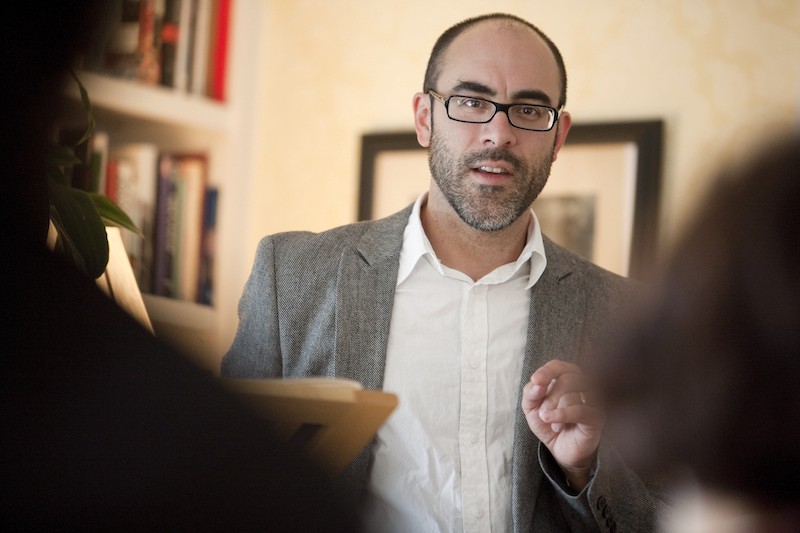news
Group Writing Advice from J. Robert Lennon

When I was in high school, I tried to collaborate on a novel with two of my friends, Jack and JJ. I can’t remember how it started — probably we were bored at lunch and one of us had an unused spiral notebook — but this project would become not only the first sustained (in both time and length) piece of fiction I attempted, but also the first serious artistic collaboration.
Okay — not serious. The novel was, in fact, ridiculous in the extreme — a Douglas-Adams-style bit of sci-fi slapstick featuring our own fictional avatars engaged in picaresque adventures with a rotating cast of extemporaneously generated fools and rogues, many of in possession of tentacles, or silicon for brains. We took turns, passing the notebook around between classes, or biking it over to each other’s houses on the weekend, and nothing we wrote was really any good. What was serious was the intensity of our efforts — for the better part of a year, work on the novel became far more important than school, than girls, than even our Dungeons & Dragons group. And you could tell it was serious because, when we started fucking with each other, we got really, really angry.
That’s what happens, of course, when you collaborate; the other guy goes against the grain. And when he does, you have to react. Jack would think up a plot device, or JJ a character, and when the notebook landed in my hands, I could tell how attached they’d become to their contributions. And I couldn’t resist. I would crush the device, or kill the character. And when my own inspiration struck, I could be sure that I would soon face its wholesale destruction in the hands of my so-called friends.
Eventually, the roadblocks overwhelmed everything else, and the project ground to a halt. But the experience stuck with me. After that, I knew how to collaborate. I knew when to push back and when to stand down; how to give up my own fine ideas for the good of the project, and how to accept other people’s ideas that didn’t speak to me in the moment. In my career I’ve managed to collaborate on creative projects often — a tag-team short story with a friend; a collection of photographs that begat poems, a collection of stories inspired by illustrations. A lecture-turned-concert. A screenplay.
But the most important collaboration I’ve learned to engage in is the same one every good writer does: the collaboration between the version of the self who writes first drafts, and the version that edits them. Indeed, I suspect that every good writer is, in fact, two writers: the one who is able to suppress the fear and self-disgust that can derail any creative effort, and the one who is able to dismiss inspiration as so much bullshit, and brass-knuckle a manuscript into shape.
I’m sure the experience is different for everyone, but my Writer #1 is insufferable — a manic, self-aggrandizing loon who won’t shut up about himself — while my Writer #2 is the picture of refinement and calm. Editing and revising are the things I can budget time for, set limits for, meet deadlines for. Drafting is the thing that makes me neglect my diet, or forget to meet my kids’ bus, or stay in bed all day quietly chuckling to myself. Luckily for the people around me, I spend more time as #2 than I do #1, and, despite the romantic popular notion of the writer as drunkard, lothario, and cad, I suspect most other writers do, too.
Collaboration, in the end, is less about accepting others than it is about giving up the self, and it’s this notion that makes all the difference when you’re working, as most of us do most of the time, alone.
***
— J. Robert Lennon is the author of a story collection, Pieces For The Left Hand, and seven novels, including Mailman, Castle, and the forthcoming Familiar. He directs the Creative Writing program at Cornell University.
Photo credit: Lindsay France









